In this week’s review of Court Judgments, we look at Madhya Pradesh High Court’s verdict reducing the sentence of minor child’s rape convict, Karnataka High Court’s directions regarding offsetting of outstanding loan against employee’s gratuity, J&K&L High court’s observation regarding a Domestic Violence complaint and Competition Commission of India’s imposition of penalties on companies for their anti-competitive practices.
Karnataka HC: Bank employees’ gratuity can’t be adjusted against their outstanding loan
The single judge bench of Justice Suraj Govindaraj dismissed a petition filed by the Canara Bank and held that that the gratuity amount payable to an employee cannot be adjusted by the bank with his outstanding loan amount.
In the case, M/S Canara Bank vs. M. Shantha Kumari, the husband of the respondent in the case, joined Canara Bank in 1975 as a peon and was later promoted as a clerk in 1987.
He availed a Housing Loan which was being repaid from time to time. In 2005, disciplinary proceedings were taken up against him with allegations of gross misconduct. Punishment of compulsory retirement was imposed in 2006.
He filed an application for the release of gratuity amount, which was rejected. He approached the Controlling Authority to seek directions to make the payments. The bank stated that there were dues to be received for the Housing loan as well as on account of the Staff Welfare Fund. Hence, these dues need to be adjusted against the gratuity amount.
The bench noted that there is a special treatment for payment of gratuity, both under Payment of Gratuity Act and also under Code of Civil Procedure, 1908. As per them, gratuity was given a special protection and the gratuity amount cannot be attached.

The court took notice of the petition, where-in the bank sought to adjust a sum of around Rs. 9.85 lakhs towards housing loan and Rs. 1.29 lakhs on account of Staff Welfare Fund liability. It observed that while the Staff Welfare Fund comes within the domain of the service conditions, the home loan is a different proposition. The terms of loan agreement, which is a commercial transaction between the bank and debtor, govern the home loan. This is irrespective of whether the debtor is employee of the bank.
The court also noted that the employee has made the claim for gratuity only in 2017 i.e., after the attaining the age of superannuation.
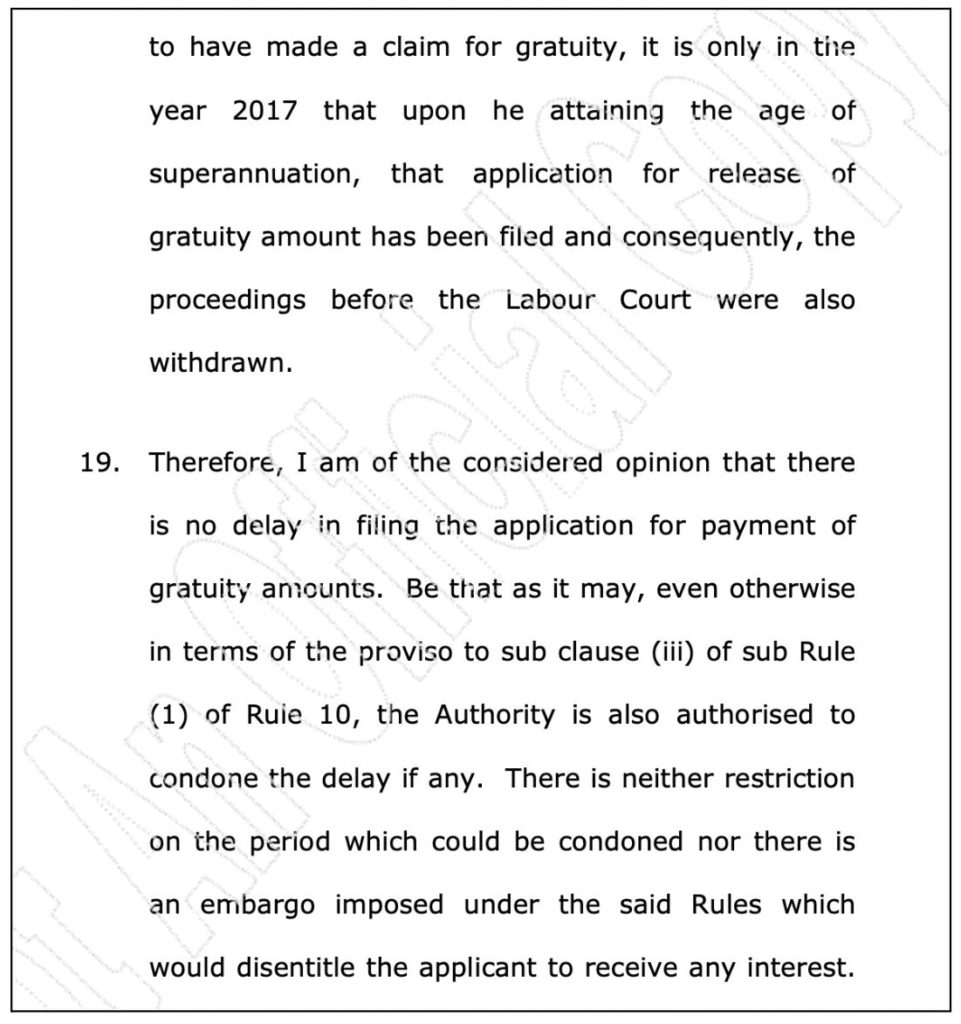
The court directed bank to comply with the earlier order of the appellate authority and proceeded to dismiss the petition by the bank.
Madhya Pradesh HC: Reduces rape convict’s sentence considering he had left minor victim alive
The Indore Bench of Madhya Pradesh High Court, comprising of Justice Subodh Abhyankar and Justice S.K.Singh reduced the sentence of a rape convict from life imprisonment to 20 years of imprisonment on the ground that he did not kill the 4-year-old victim after the heinous act.
The Appellant in this case, was accused and convicted under Section 376(2)(f) of IPC for committing rape upon a 4-year-old girl. The appellant submitted an appeal against the conviction.
He submitted that he was falsely implicated in the case. He further pointed out that the FSL report was not brought on record by the prosecution. Another argument was that this was not a case where-in he deserved the punishment of life imprisonment.
The state argued that the appellant does not deserve any leniency and the appeal needs to be dismissed. The court examined the submission of the parties and the trial court record and opined that the appellant was rightly convicted. The court stated that non-submission of the FSL report before the court was gross negligence of the police. However, the evidence proved the guilt of the appellant beyond doubt.
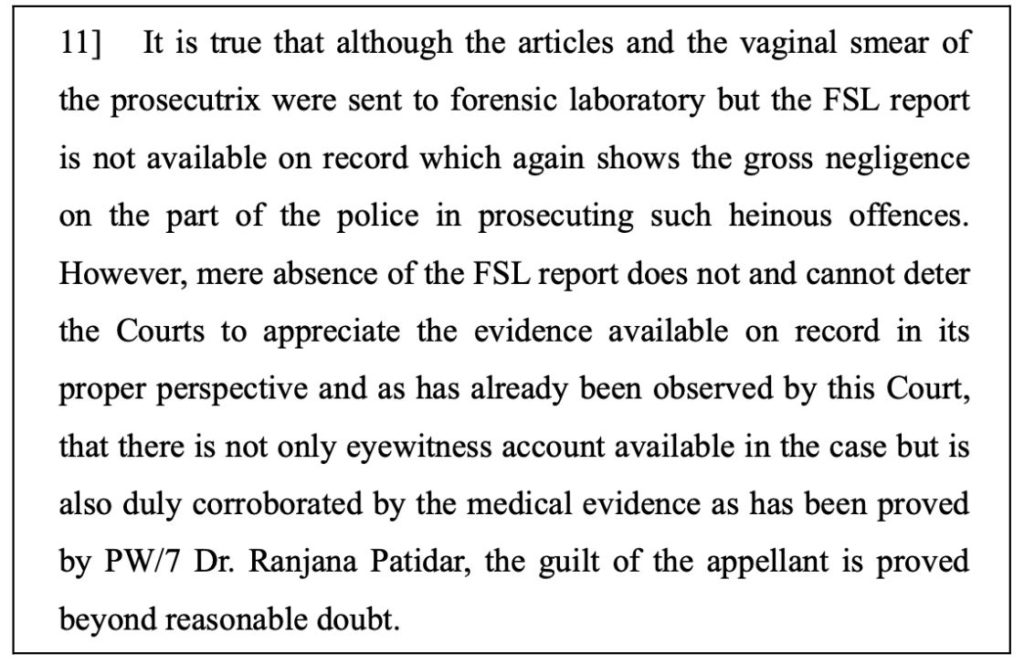
Therefore, the court upheld the conviction. In the appeal, request was also made to reduce the sentence to the time which he already spent under imprisonment. The court rejected this appeal and stated that the sentence cannot be reduced to the time already undergone in imprisonment.
However, it noted that the appellant was kind enough to leave the victim alive, therefore the life imprisonment is reduced to 20 years of rigorous imprisonment.

J&K&L HC: Once marriage stands validly dissolved by foreign court, proceedings under Domestic Violence Act cannot be initiated
A petition was filed in the Jammu & Kashmir and Ladakh High court challenging the complaint under Domestic violence Act against the petitioner. The complaint was challenged on the ground that there was no relationship of husband and wife between the petitioner and respondent since the passing of the decree whereby the marriage was dissolved.
The couple were married in 2007 in Jammu and post marriage, they became permanent residents of Germany. The relationship turned hostile after shifting to Germany. As per the petitioner, he came to India during February 2014, for a period of 10 days.
Upon his return to Germany, he found that the respondent i.e., his wife left the matrimonial house along with gold, goods, and money. Efforts to know the whereabouts were futile and she was untraceable. As per the petitioner, the wife filed a false and frivolous case in Germany and started residing separately. Several attempts of reconciliation by the court in Germany failed as she refused to stay with him. He approached District Court Wisman, Germany and filed for divorce. The foreign court allowed the divorce petition in July 2017.
The domestic violence complaint filed by the respondent/complainant does not disclose the divorce petition in the foreign court and that the marriage was dissolved.
The court stated that Section 2(f) of the Domestic Violence Act defines ‘domestic relationship’ and there was no domestic relationship existing between the parties. Without which the provisions of the Domestic Violence Act cannot be invoked.
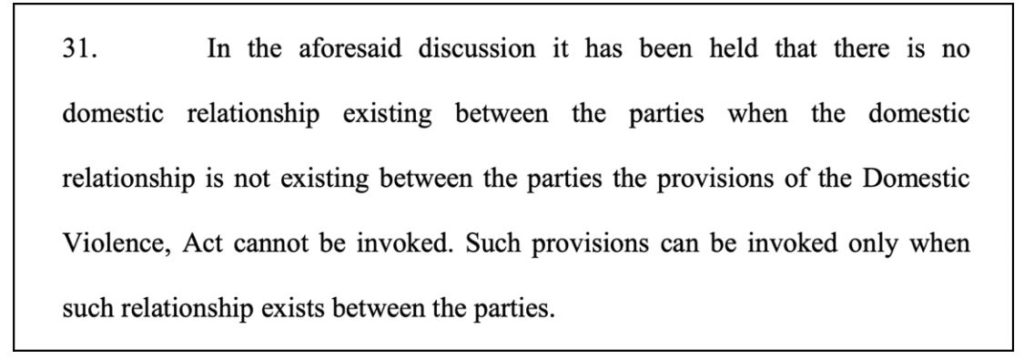
The consideration before the court was the jurisdiction of the foreign court. It observed that since both were permanent residents of Germany, they are subjected to the laws of the country. Therefore, the decision of the foreign court in allowing the petition of dissolving the marriage stands. It also noted that there was no challenge against the decision of the court by the respondent i.e., wife which implies that she has accepted dissolving of marriage. Therefore, as per the decree, the relationship ceases to exist. Hence, the court quashed the complaint of domestic violence.
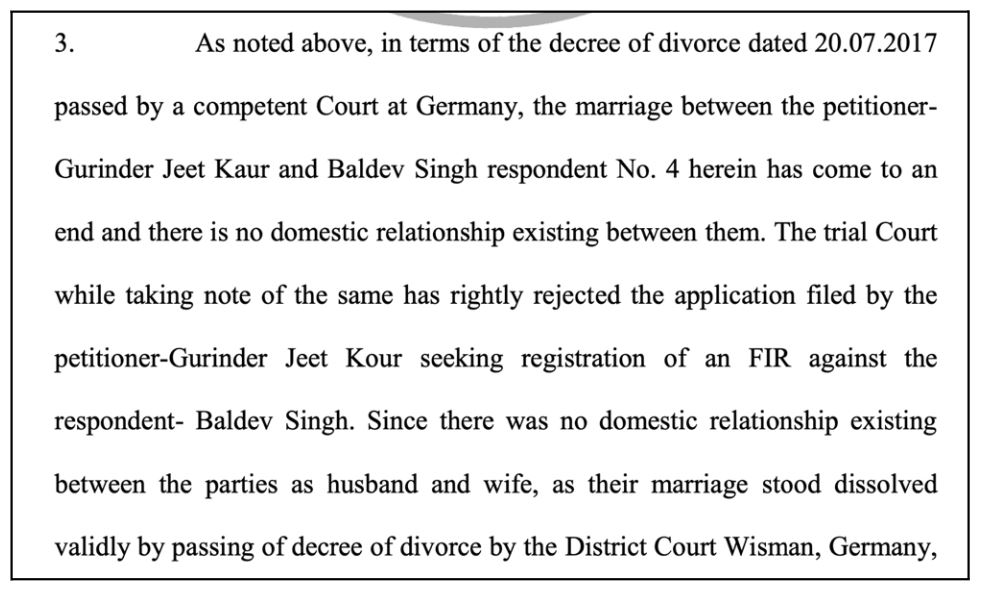
Penalty imposed by The Competition Commission of India on Google, Go-Ibibo, Make My Trip, OYO
The Competition Commission of India (CCI) has held that the commercial arrangement between Make My Trip, GoIbibo and OYO was anti-competitive and imposed an overall penalty of Rs. 392.36 crores.
In another case, CCI imposed a penalty of Rs. 1.33 thousand crores on Google for Anti-competitive practices in relation to Android Mobile devices.
Rs. 392 crores penalty on GoIbibo, Make my Trip & Oyo.
The CCI bench was adjudicating the case of Federation of Hotel & Restaurant Association of India (FHRAI) & Anr, vs. MakeMyTrip India Pvt. Ltd(MMT) & Ors. It held that the commercial agreement between MakeMyTrip, GoIbibo and OYO was anti-competitive as it led to de-listing of FabHotels, Treebo and independent hotels which were availing the services of these franchisors.
FHRAI has filed a case under Section 19(1) of the Competition Act, 2002 against Make My Trip and GoIbibo (collectively “MMT-GO”) and Oravel Stays Pvt. Ltd. (“OYO”). The allegation was that there was a commercial arrangement to de-list the competitors of OYO from MMT-GO online portals.
FHRAI alleged that MMT-GO has imposed price parity in its contracts with hotel partners, which ensured that the hotel partners were not allowed to sell their rooms to any other Online Travel Agency (OTA) or on its own online portal at a price lesser than MMT-GO platform. However, MMT-Go can fluctuate the prices of such rooms. Further, the partners cannot refuse to provide rooms on MMT-Go platform of they were being provided on other OTA.
MMT-GO was alleged of indulging in predatory pricing by offering hotel rooms at a lesser price. The customers were offered deep discounts which helped in expansion of their own network and in customer retention. This has impacted the smaller OTAs in the market. Treebo & FabHotels were denied market access because they were removed from the MMT-Go platform as they did not agree to pay the commission brokerage charged by the platform. Meanwhile, MMT-Go has entered into a confidential commercial agreement with OYO, where-in the later was given preferential treatment on the platform. CCI held that this commercial agreement was non-competitive and passed directions to MMT-Go.
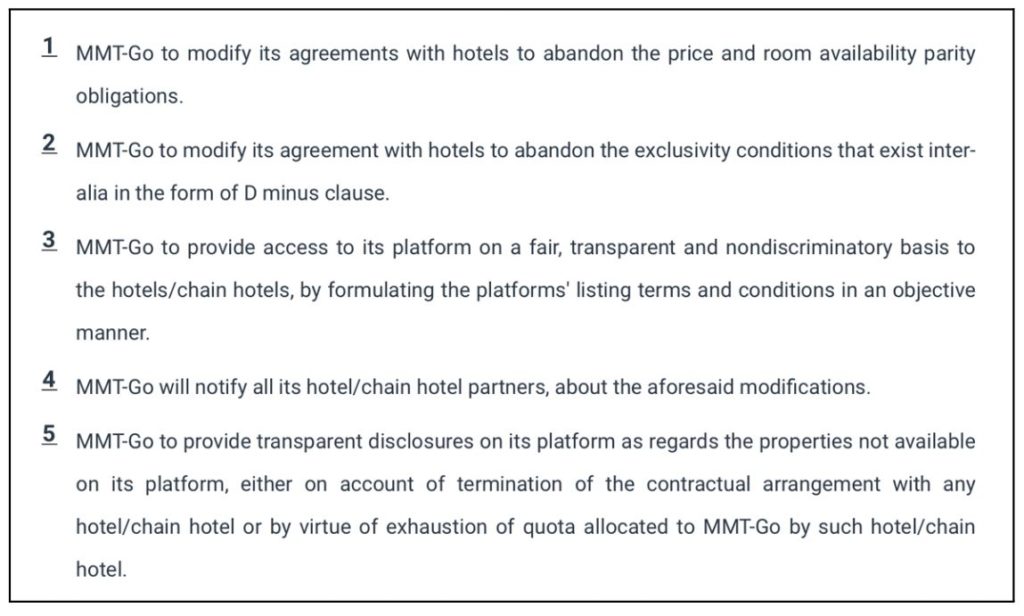
It imposed a monetary penalty of Rs. 223.48 crores on Make My Trip and GoIbibo and penalty of Rs. 168.8 crores on OYO, which is 5% of their turnover.
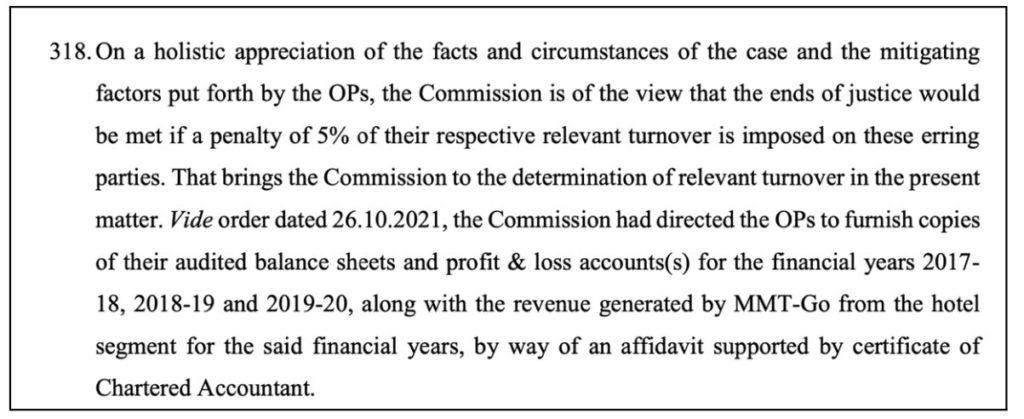
Penalty of Rs. 1.34 thousand crores imposed on Google
In another case, CCI held that Google was abusing its dominant position in multiple markets in the Android device ecosystem and has issued a cease and desist order against Google. It imposed a penalty of Rs. 1,337.76 crores and also laid down measures which Google must comply with.
The mobile operating system (OS) – Android, was acquired by Google in 2005. CCI in its press release stated that it has studied the various business practices of Google including its licensing of Android mobile OS as well as other proprietary mobile applications like Play Store, Google Search, Google Chrome, and YouTube.
It looked into the substitutability between Google’s Android Play Store and Apple’s iOS AppStore and found that there was no substitutability between them. CCI noted that Google is dominant in all the relevant markets in India, including – licensable Operating Systems (OS) for smart mobile devices, app store for Android smart mobile and general web search services and online video hosting platforms (OVHP) in India.
CCI observed that Google operates and manages Android OS and other proprietary licenses and has entered into multiple agreements with the Original Equipment Manufacturers (OEMs) to use the Android OS and Google apps in their smart devices.
The commission concluded that these agreements assured that the search app, widget, and chrome browser were pre-installed in on Android devices, which provides a significant competitive edge to Google’s search services. This advantage was extended to its other applications like YouTube.
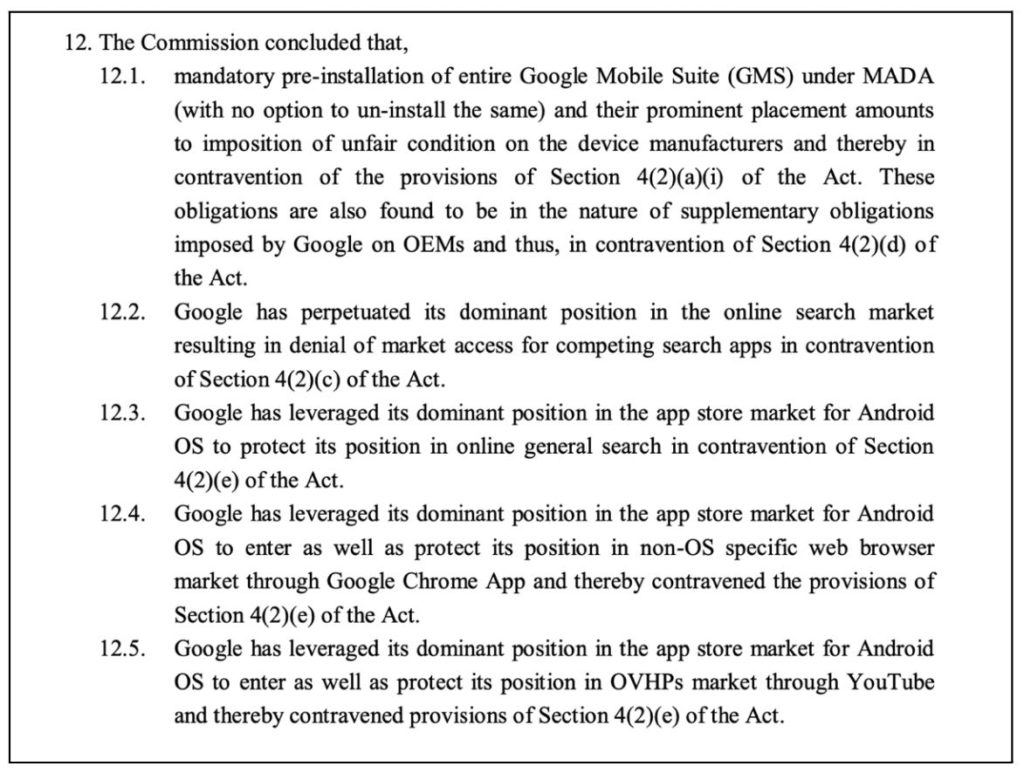
It noted that, with these agreements in place, the competitors of Google never stood a chance to compete. Further, these agreements have also eliminated the choice for the users. CCI held that the markets should be allowed to compete on merits and the onus lies on the dominant player i.e., Google in this case, to prove that its conduct does not impinge the competition on merits.
Apart from the monetary penalty, CCI has issued certain measures which includes – barring of google from forcing OEMs to pre-install Google’s apps, not to restrain OEMs to choose from Google’s proprietary apps, prohibition of offering any monetary or other incentives to OEMs, barred from entering into any arrangements that ensure exclusivity etc.
Featured Image: Review of Court Judgments


